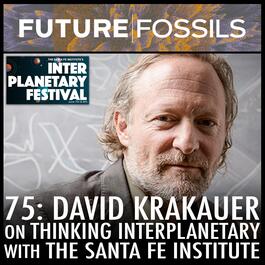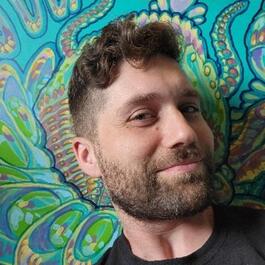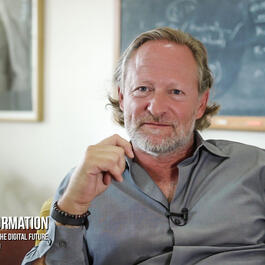
75 - David Krakauer (Thinking Interplanetary with The Santa Fe Institute)
This episode’s guest is David Krakauer, President of the Santa Fe Institute – the world’s pre-eminent research center for complexity science. We discuss SFI’s new Interplanetary Project and how they are weaving scientists, engineers, science fiction authors, concept artists, and musicians together into a new collaborative storytelling and visioning project about how we can sustainably scale human civilization beyond Earth – and help spark a renaissance of Big Picture thinking and Big Problem solving worthy of our species in this century. About SFI and the Interplanetary Project: https://santafe.edu/research/initiatives/interplanetary-project About the Interplanetary Fest: https://interplanetaryfest.org/lineup Cool local news coverage about David & The Interplanetary Project: https://www.sfreporter.com/news/coverstories/2017/07/11/out-of-this-world/ “Part of my job, and SFI’s job, is to not allow people to imagine that they’re living in isolation – IN ANY SENSE. Right? Socially, intellectually, economically, technologically, and so on.” “Is there a different way, now, of getting the best of what we have done to as many people as we possibly can? And in a way that isn’t preachy, isn’t didactic, is genuinely engaging and fun? And where a single individual, somewhere in the world, who we’ve never met, who has limited resources, could make a real contribution to it?” We Discuss: • How can we make ideas that benefit the world as easily accessible as possible, as open for expansion and review? • Why it is necessary to take a planetary perspective, and why SFI decided to open up this vastly trans-disciplinary Interplanetary Project; • Why it’s worth reviving the spirit of the World’s Fair for a new wave of international co-imagination; • How complexity science has invaded our everyday thought in the form of “hyperobjects” – launching us out of the enclosed infinity of modernity (endless, but knowable) and into a new exploration of capital M “Mystery” in the cosmos, in which the edges of the map are now its center(s); • The importance of soliciting the perspectives of children and other marginalized groups to help us strike the course for a new renaissance; • Whether to be comforted by “human exceptionalism” and our uniqueness in a vast and senseless cosmos, or by the possibility of our total lack of specialness in a cosmos rich with life and mind; • What Krakauer thinks of the enduring “either/or” question, of why we should be spending ANY money on space exploration when we have so much hardship here at home; • Does the existential serve the utilitarian? Or to put it another way, is answering the Big Questions just a luxury, or is it the fruit and reward and deep work of human existence? • Looking at the development of fields like AI, might it not make more sense to take on the biggest projects indirectly, obliquely, by focusing on tiny pieces and more modest goals? • Is Earth’s “minimum viable product” a second complete biosphere? Will “humans” really ever make it to other worlds, or will only “biospheres” – humans understood as focal points of entire ecosystems, within which we will travel? • What is the role of science fiction in imagining the future? • How does our hyper-connectivity change the way we understand the self and each self’s role in something greater? • What new (and likely anti-fragile, decentralized) modes of governance will emerge in this era? • Ethereum is sponsoring SFI’s computational science summer school, interested in using network theory and agent-based modeling, and other complex systems sciences concepts/practices to explore new modes of social infrastructure and governance; • How important it is to not regard humanity’s Big Problems as merely software engineering problems, and what we miss by turning away from our cultural inheritance in the regard of these matters; • Why it’s silly to think of art and science as completely separate projects, and how SFI uses the best of both to inspire the next generation of planetologist; • How TED presents an inaccurate, maybe even disingenuous, view of the scientific process; • How the Santa Fe Institute’s first-ever festival is just the tip of a global, all-inclusive brainstorming session about the best possible future for our species; • And more! Subscribe on Apple Podcasts: https://itunes.apple.com/us/podcast/future-fossils/id1152767505?mt=2 Subscribe on Stitcher: https://www.stitcher.com/podcast/michael-garfield/future-fossils Subscribe on Spotify: https://open.spotify.com/show/2eCYA4ISHLUWbEFOXJ8C5v Subscribe on iHeart Radio: https://www.iheart.com/podcast/269-FUTURE-FOSSILS-28991847/ Join our Facebook Discussion Group for daily news and conversations: http://facebook.com/groups/futurefossils Support the show (and an avalanche of other mind-expanding media): http://patreon.com/michaelgarfield Get bonus content on Patreon Support this show http://supporter.acast.com/futurefossils. Hosted on Acast. See acast.com/privacy for more information. This is a public episode. If you'd like to discuss this with other subscribers or get access to bonus episodes, visit michaelgarfield.substack.com/subscribe
From "Humans On The Loop"




Comments
Add comment Feedback